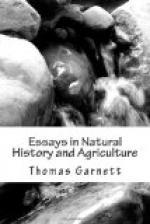as the marriage of the gentleman in the story, which
relates that, being good-tempered but ugly himself,
he married a handsome ill-tempered wife, hoping that
his children would have his good-temper and their
mother’s good looks; but when they came, they
were as ugly as the father and as ill-tempered as
the mother. So it may prove with these hybrids—they
may not always thrive in fresh water; they may not
grow to a good size; they may not rise at the artificial
fly; they may be worthless for the table. Nevertheless,
it is desirable if possible that this should be ascertained.
The progeny of a male Salmon and a female Trout may
be much better or much worse fitted for a continual
residence in fresh water than the descendants of a
male Trout and a female Salmon; but this can only
be determined by experiment. Dr. Lindley says,
in his introduction to the “Guide to the Orchard,”
that in the cross fertilization of fruits, the seedlings
always partake more of the character of the male than
of the female parent. But I believe that in breeding
mules it is found more desirable that the father should
be an ass than a horse. In my poultry yard I breed
hybrids between the musk duck and the common duck,
and I find that I have a much better progeny from
the musk drake and the common duck than from the common
drake and the musk duck. In the latter cross,
although the males are fine birds, the females are
not larger than a widgeon, and fly about almost like
wild ducks. This may not always be the case,
but it has proved so with me.
But to return to the fish. If any gentleman who
is interested in such matters will do me the honour
to read this paper, and wishes for further information
on the subject, I shall be happy to give it, so far
as I am able. Very sure I am that the sportsman
who once fairly starts as a fly-fisher, and is so
fortunate as to hook a Salmon or a large Trout, will
thenceforward despise or lightly esteem corks and
floats, ground-bait and trimmers, punts and Perch
fishing, and will fairly wish them all exchanged for
a nice stream well stocked with Trout—as
a gentleman lately said to me, fly-fishing is a perfect
infatuation! He was quite right. The extreme
avidity with which it is followed by the thoroughly
initiated, can only be explained on that supposition;
to the casual observer, there does not appear to be
any strong excitement in it. But that is a great
mistake. Let me get to the bank of a river well
stocked with Trout in a good humour, early in the
morning, and I feel neither hunger, thirst, nor fatigue
if I fish until dark without tasting of anything.
And the excitement of hooking a ten or twelve pound
Salmon is not much inferior to that produced by a long
run after the hounds.




